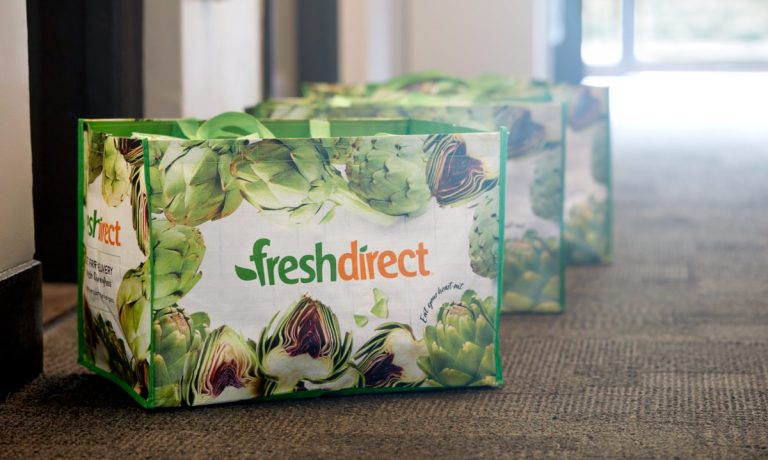FreshDirect Mines Decades of Delivery Data as Grocery Newcomers Come and Go

The online grocery space has matured rapidly since March 2020, with an influx of new customers both driving sales for incumbents in the space and presenting a market opportunity for new entrants. However, new economic pressures in recent months are beginning to change the face of eGrocery.
FreshDirect, an Ahold Delhaize-owned online grocery delivery service that serves New York, New Jersey, Connecticut, Pennsylvania, Delaware and Washington, DC., is looking to navigate these headwinds and outdo newcomers by leveraging its two decades of experience in the space to gain the competitive edge in this difficult environment.
“As competitors, what we have to be cautious of is making sure that we’re really paying attention to the consumer,” Dave Bass, the company’s managing director, told PYMNTS in an interview. “And that’s not to say that new entrants to the space are wrong, but what we have to make sure is that the solutions that we provide going forward are really based on consumer needs and desires, and not just on what might be an interesting idea to explore.”
Bass declined to mention specific strategies that exemplify this non-consumer-centric approach, but he stated that as eGrocers explore new models, “some of those trials and pilots might also end up being failures,” leaving those without a base in tried-and-true strategies struggling.
One might imagine Bass could be referring to startups such as the ultrafast grocers, which, after months of rapid expansion, have begun bowing out one by one. Earlier this month, for instance, it was reported that Berlin-based ultrafast startup Gorillas pulled out of Italy shortly after the company’s departure from Belgium in June. Also in June, ultrafast grocer Jokr announced that it was ceasing operations in New York and Boston.
Related: The Quick Seems Dead as Ultrafast Grocers Retreat En Masse
Furthermore, back in March, another player in the space, Buyk, announced that it was shutting down, and Bloomberg reported that month that ultrafast grocer Fridge No More was closing up shop.
The New Restaurant
One strategy that grocers are turning to right now, as rising food costs influence consumers’ food purchasing behaviors, is offering prepared meals delivered at a lower price than ordering on demand from a restaurant aggregator.
Bass noted that FreshDirect’s home meals have been seeing “really good continued uptake … as consumers look for value across wherever they purchase their food from,” given that the products are sold at “really good price points against what someone might find in a restaurant.”
FreshDirect is not the only grocer offering prepared delivery meals to gain stomach share from restaurants. On Tuesday (July 19), The Kroger Co. announced that it is expanding the capacity of its ready-made meal and meal kit delivery business, Home Chef, with a new production center in Douglasville, Georgia.
Read more: Kroger Boosts ‘Home Chef’ Meal Prep As Restaurant Take Out, Delivery Slump
Additionally, earlier this year, Instacart announced the launch of its Ready Meals Hub, offering meals prepared by grocers’ in-store kitchens as “cost-effective alternatives to restaurant takeout.”
Going Private
Major retailers including Walmart and Target have been noticing food shoppers’ switch to private-label items. Bass noted that Ahold Delhaize’s brand Nature’s Promise has been growing “at a very high rate, more so than we even expected” and that, as such, the eGrocer intends to expand the brand going forward.
Indeed, research from the May U.S. edition of PYMNTS’ Digital Economy Payments study, “Digital Economy Payments: How Consumers Pay in the Digital World,” showed that consumers’ average spending on their grocery purchases fell between March and April even as food prices rose, indicating that consumers were likely making the choice to shift to lower-priced brands or products.
See also: Insufficient Funds Caused 27% of Consumer Payment Declines in April
To that point, Bass observed not only FreshDirect customers’ adoption of private-label options, but also their tendency, in recent months, to switch to lower-priced proteins such as “going from … steaks into grinds” and buying more “value-packed chicken.”
According to U.S. Bureau of Labor Statistics (BLS) data released in the Consumer Price Index for All Urban Consumers (CPI-U) last week, food prices in June were up 10.4% year over year — significantly higher than the 9.1% price increase for all items. Additionally, food at home (i.e., grocery) prices were up 12%.
Up Close and Personal
As FreshDirect looks to both grow its customer base and drive frequency with existing customers, the company is looking to improve its personalization, observing “different affinities” between various products and getting “more granular,” so as to “better match our assortment to what customer expectations are, in some cases maybe without them telling us.”
In addition to tailoring recommendations and messaging to specific consumers, the brand is also looking to get smarter about its marketing in response to a range of other conditions. Bass cited the example of a pilot test in New York City in which billboards would show different foods in response to different temperatures, such as advertising soup on cold days.
“We were excited to see about the engagement that consumers had with that,” Bass said. “So, we’ve really looked at actually every way that we communicate with our customer and are trying to figure out ways to do that in a more powerful fashion.”
For all PYMNTS retail coverage, subscribe to the daily Retail Newsletter.